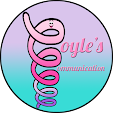I just tested out my own meeting room through Zoom. The above picture is one of the many Match the Memory games that I have made. This one targets basic position concepts. You can share your screen, your sound, and give control over to the client so they can take a turn and it actually makes the therapy interactive! You can write or draw directly on the computer screen (as I did above) and then clear it. I know Zoom is a platform used by some SLP's to do teletherapy although I have no experience with that myself. I wanted to see how it worked. I have watched some informational videos to learn a little bit about teletherapy and I have been intrigued about possibly doing some myself during school breaks, such as summer. Now that I have tried out Zoom, I am even more interested.
My sweet hubby helped me out and I was able to do a few interactive speechie games with him via the platform. All of the sudden something that seemed abstract and unknown now seems obvious and efficient. I "got" it! I have already moved many of the traditional laminated paper/velcro therapy materials to digital platforms- not for teletherapy but just my normal face to face practice. Interactive technology allows me to do more therapy targets and keeps my students engaged so I have been using it more and more in lieu of my traditional items and card sets. I even find incentive games to be SO much easier online. I use a snakes and ladder (like chutes and ladders) digital game (and a few others too) as reinforcement in my therapy sessions and it would be SO easy to use that in virtual therapy. My kids work harder and I can do more because I eliminate the time it takes to manipulate the game pieces and set them up/put them away. Digital therapy materials and reinforcement games are faster and I get more targets per session. Quite simply they make me more efficient and effective.
So in these uncertain times if you are getting homework packets together for students and/or moving to deliver services online, consider giving your students a list of links that they can use to practice their targets at home. Just in case you want to do that, I am making a list below of all the online therapy resources I have created myself. These could be given to parents for home practice and included in your home packets and/or used in teletherapy. I think kids would like online practice opportunities!
5 Online Resources That You Should NOT Miss If You Are An SLP!
1) Interactive Sites for Speech and Language Therapy- this is your first stop. It is the most comprehensive list of online interactive therapy materials that I have ever seen. It is organized by topic to make it easy to find the online materials that would work for your students. This resource is MASSIVE. It is organized like this starting at the top and each of these main headings is all caps and highlighted in yellow:
- Informal assessment
- Language and Vocabulary (pink highlighter sub-categories such as categories, basic concepts, etc),
- Comprehension and Higher Level Skills (such as main idea and inference)
- Grammar and Syntax (with blue highlighter sub-categories such as mad libs, verb tense, etc)
- Morphology
- Articulation
- Social Skills
- Phonological Awareness and Phonics
- Language Through Literacy (26 Online FREE Book sites)
- Incentive Games
2) Match the Memory Articulation and Language Games- These two blog posts give you an abundant memory game resource with so many therapy targets for both speech and language. The speech post is organized by sounds or sound processes (at the bottom) and the language post is organized by topic.
3) Quizlet- This seemed like a no-brainer for me. I have been using card decks in therapy for years. Quizlet card decks talk, read text for the students, are interactive when a kid clicks it to turn the card over, and lets you add visuals easily. So to me Quizlet cards for therapy are just the updated 2020 version of what I have been using for 20 years. To date, I have made over 250 card decks covering a variety of speech and language goals. I have 14 folders that have it all neatly organized by topic and skill level to make finding a card set that matches your client's goals a snap. Some of my card sets are password protected and access can be purchased as part of some of my TpT products. Most can be accessed by anyone, however.
4) Wordwall (Blog)- This is a much newer resource and I don't have a lot made here...YET. I am going to be making more though, I have the next two weeks off work and I am basically self-quarantined at home because I am well and I want to stay that way. So, expect lots of new interactive therapy materials to be made. Anyway, I just paid for a subscription and am going to be making a lot of activities.
5) Super Spinners- I am not sure about this for independent practice or not, but it could definitely be used by you for online learning.
Language Through Literacy- As I said, my interactive sites resource is massive. Don't overlook the list of 26 FREE online book sites that you can give parents to read with or have their kids read. It is pretty far down the page. Maybe that list with some tips on how to stop and talk about the story and ask questions about the book would be a great idea.
I hope that helps liven up your online sessions and /or get your kids motivated about doing speech therapy homework!
Ms. Coyle MS CCC/SLP


























